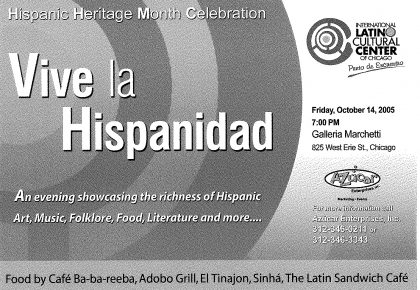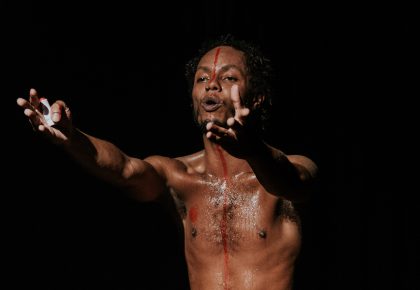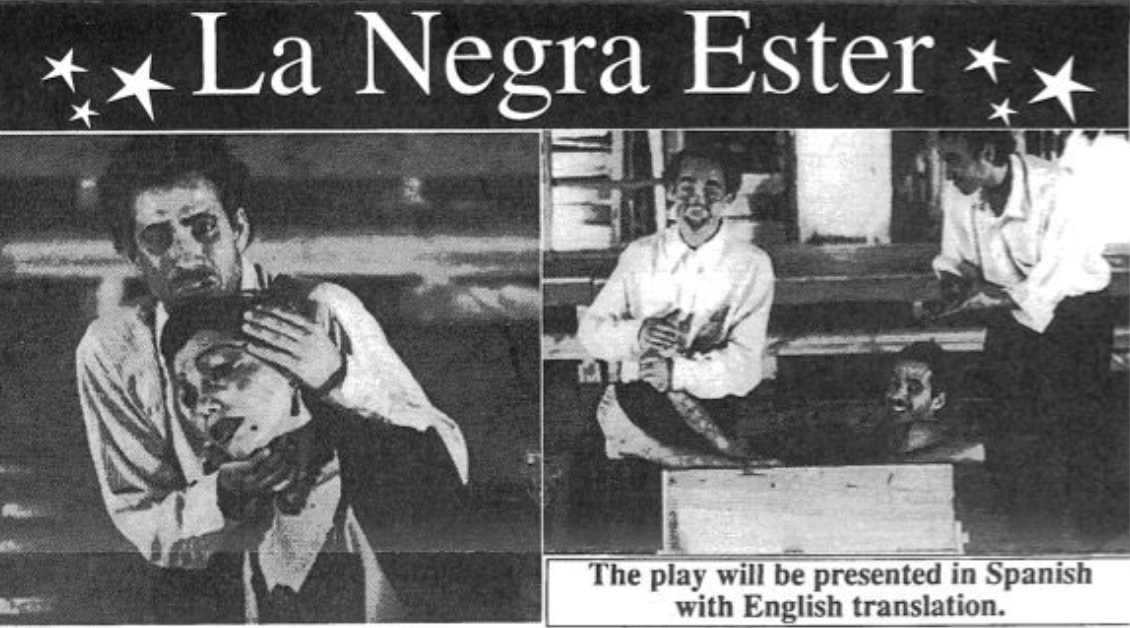
Almost ten years after the Chicago Latino Film Festival took its first baby steps in 1985 with that now legendary screening of 14 films against a concrete wall in St. Augustine College in Chicago’s North Side, the board members and staff of Chicago Latino Cinema, the entity created around the Festival, decided that the time had come for the organization to spread its wings. If there was an audience for films from all over Latin America, Spain, Portugal and the United States, the thinking went, there must be an audience in Chicago for additional arts programming from all corners of the Pan-Latino diaspora. After all, the city was not only home for one of the largest Mexican and Puerto Rican communities in the United States; it also harbored a large Central American community not to mention a significant number of Cubans and Cuban-Americans who, at the time, had turned a stretch of Milwaukee Ave that crossed Wicker Park and Logan Square into the Midwest equivalent of Calle Ocho. And did we mention the significant South American presence spread out throughout the city and suburbs?
The full history of the International Latino Cultural Center of Chicago (ILCC) cannot be fully told without a trip through time and space to those very first non-film events. We may not have a time machine, but we do have a rather modest archive full of programs, ads, photos and all sorts of collateral material. Items may be missing from that archive; it would take a full time historian to dig through old microfilms and microfiches to help us fill in the blanks. Still, what we found in those archives reveals an organization that was beginning to test the boundaries of what a fully multi-disciplinary Pan-Latino arts organization would look like.
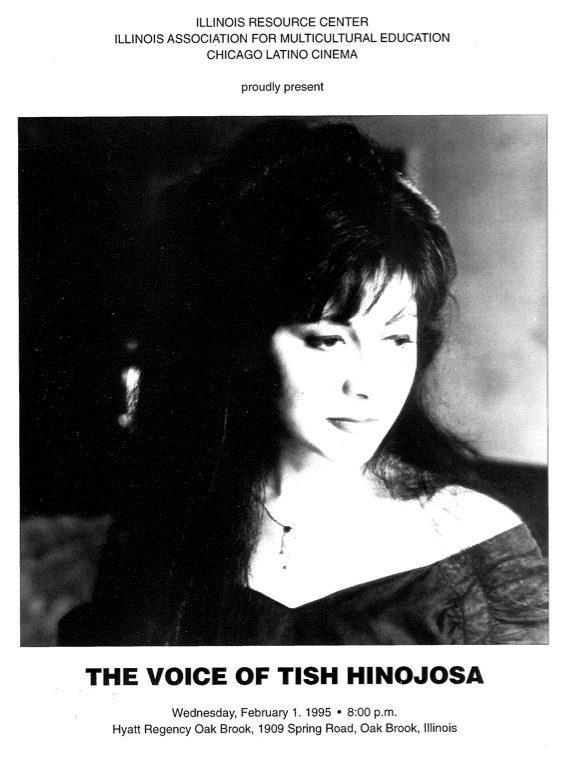
A concert titled The Voice of Tish Hinojosa held at the Hyatt Regency Hotel in Oak Brook on February 1, 1995 was the first evidence of a pre-ILCC non-film event we could find in our archives. Co-presented with the Illinois Resource Center and Illinois Association for Multicultural Education, Tish Hinojosa was at the time one of the supreme voices of the Austin music scene in particular and American folk music in general. Although she hasn’t performed much in the Chicagoland area these past couple of years, Hinojosa is still in high demand, especially in Europe. Last year, she released her highly autobiographical 17th album, With a Guitar & a Pen, described by Pop Matters as “optimistic,” “happy, even joyous.”
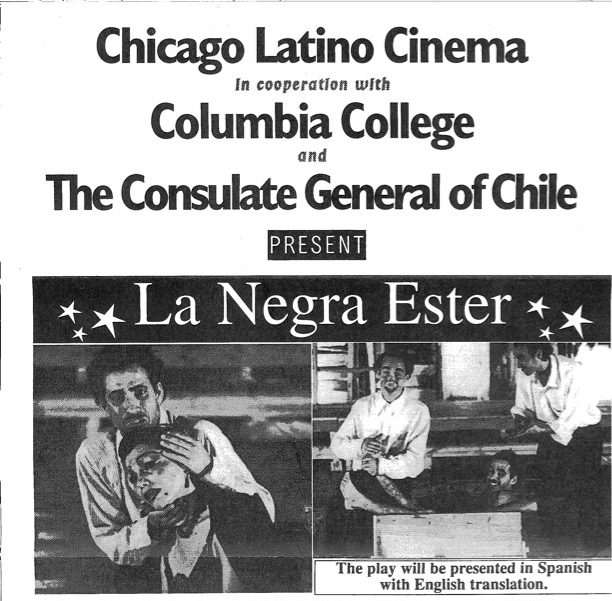
The following year, Chicago Latino Cinema in collaboration with Columbia College and the Consulate General of Chile presented, in Spanish with English translation, the Chilean play La Negra Ester, based on the poem Las décimas de la negra Ester by Roberto Parra and and performed by the Chilean theater group Gran Circo Teatro. Staged from October 2-5, 1996 at Columbia College’s Getz Theater, home for many of the theatrical productions and concerts the ILCC would present and co-present for close to two decades, and originally staged prior to the 1989 general elections that led to the end of military rule in Chile, La Negra Ester tells the story of Roberto Parra’s, brother of Violeta and Nicanor Parra, love affair with a beautiful prostitute, La Negra Ester. On an article about the L.A. stop of the play during its first U.S. tour, the Los Angeles Times highlighted the actors’ clownish makeup and “experiments with many universal folk-theater techniques, including mime and commedia dell’arte. International critics have also cited such influences as Charlie Chaplin and Groucho Marx.” Gran Circo Teatro is still active in Chile under the leadership of Rosa Ramírez, widow of company founder Andrés Pérez.
Two years later, Chicago Latino Cinema joined forces with Columbia College Chicago, The Consulate General of Mexico and The Mexican Cultural and Educational Institute to celebrate the centennial of Mexican cinema with the series Mexican Cinema: Reflections of a Nation. A series of seven films, including Emilio “El Indio” Fernández’s Salón México (1948), Felipe Cazals’ Canoa (1975) and Jaime Humberto Hermosillo’s María de mi corazón (1979) co-written by Gabriel García Márquez, were screened at Facets Multimedia (today Facets Film Forum), from November 6-12, 1998. It was one of many film retrospectives the organization would produce outside their annual film festival.
Another centennial was celebrated the following month: the birth of Spanish poet Federico García Lorca. A special presentation of his classic play Yerma staged by New York’s Repertorio Español made its Chicago premiere on December 4 and 5, 1998 at The Getz Theater. In its review of this production directed by René Buch with music by Marshall Coid, ¡Exito!, the Chicago Tribune’s Spanish-language weekly, highlighted the play’s Pan-Latino cast and the use of Gregorian chants and avant-garde music to highlight the play’s highly charged eroticism and tragedy.
Colombia’s Estudiantina Boyacá made its Chicago debut on May 8, 1999 at Loyola University’s Sullivan Center thanks to a collaboration with Columbia College Chicago, the Consulate General of Colombia and the American Colombian Foundation. Founded in 1979 by Samuel Malagón Bravo in the central Colombian department of Boyacá, bordering Venezuela to the northeast, the Estudiantina uses a chamber instrumental format as its foundation for its repertoire of traditional music. The Estudiantina Boyacá is currently made up of a roster of ten emerging talents who bring the full force of their youth to the music they began to recognize, admire, and value from a very young age.
Chicago Latino Cinema, and later the ILCC, placed a huge bet on tango after the international success of such spectacles as Luis Bravo’s Forever Tango. One of the organization’s early tango programs was the multidisciplinary event Paris in Chicago…and Tango held at multiple locations between July 7 and 16, 1999. The event featured a photo exhibition documenting the life and history of Paris from 1880 to 1968 at what was then known as the James R. Thompson Center and is today being turned into Google’s Chicago headquarters. Paris in Chicago…and Tango also featured a special screening of Fernando Solana’s set-in-Paris 1985 film, Tangos, the Exile of Gardel at the Water Tower Theatre complex (July 14) and ended with Tango: The Songs, Music and Dance featuring the cast of Solo Tango at the Getz Theater (July 15).
This was followed by Naturalmente Tango, presented from December 2-5, 1999 also at the Getz Theater. Advertised as “the history of tango shown through music, song and dance in one spectacular performance of theatrical beauty” by the Uruguayan group Tango Tan, the event is notable because, on its program book, Chicago Latino Cinema Founder and Executive Director Pepe Vargas formally announced the organization was changing its name to the International Latino Cultural Center of Chicago.
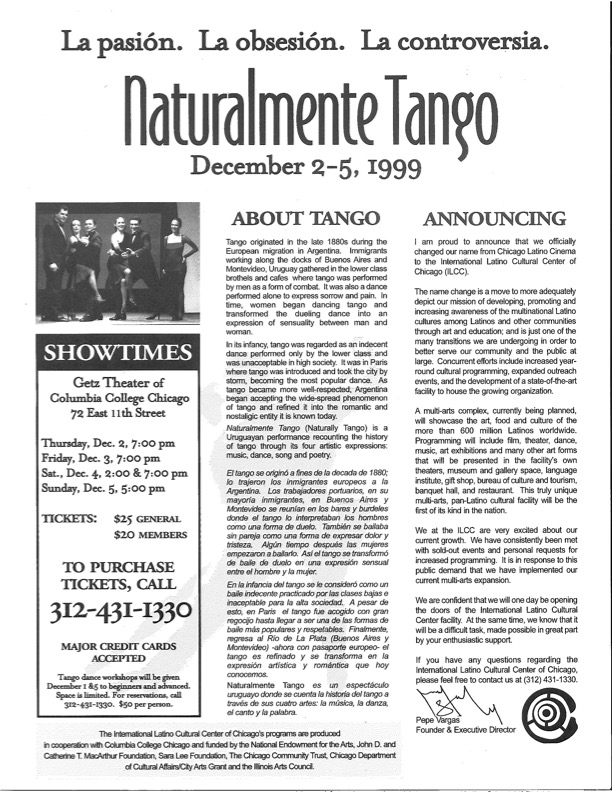
“The name change is a move to more adequately depict our mission of developing, promoting and increasing awareness of the multinational Latino cultures among Latinos and other communities through art and education; and is just one of the many transitions we are undergoing in order to better serve our community and the public at large,” wrote Vargas. In that message, Vargas also announced the organization’s plans to build a multi-arts complex that would showcase the myriad artistic disciplines practiced by Latinos around the world.
And so, as the new millennium approached, the newly renamed organization looked towards a future full of possibilities and new challenges.
As part of its fundraising campaign commemorating its 25th anniversary, the International Latino Cultural Center will be hosting a dinner celebration at CineCity Studios, 2429 West 14th St. on Friday, November 14, featuring a solo performance from Grammy® and Latin Grammy® Award winning artist Alex Cuba and the very best in Latino cuisine. Doors open at 6 p.m. For more information, visit the ILCC’s official fundraising dinner page.
Unable to make the event? Never fear, you can still be part of our campaign with your individual contribution. Every single bit helps our mission to preserve in the city of Chicago a space for Pan-Latino arts in all its glorious disciplines. For more information on individual giving visit our individual giving page.
The International Latino Cultural Center of Chicago is a 501(3)(c) nonprofit cultural organization. All contributions are tax-deductible to the full extent allowed by the law.
